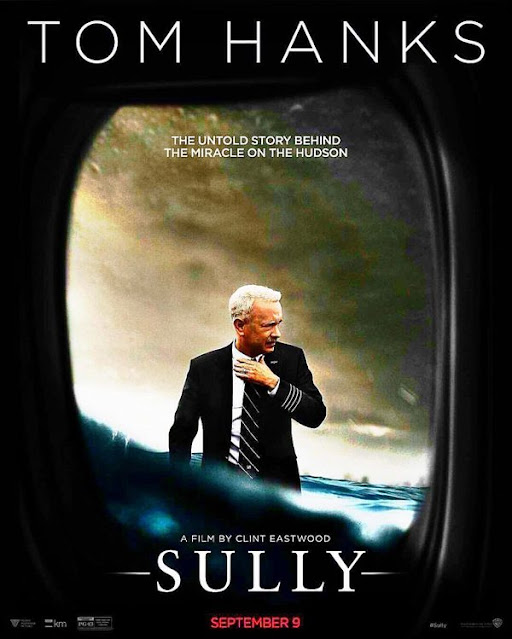Sully
At the heart of 2016's SULLY is a lesson that I suspect will be less and less acknowledged and practiced as the twenty-first century progresses: the machines are not smarter than us. Even though they were programmed by humans. Even with a recent story of how artificial intelligence will one day overtake we of flesh and blood. Even with accounts of driverless vehicles becoming mainstream. Let the story of how in January 2009 commercial airline pilot Captain Chesley "Sully" Sullenberger guided US Airways Flight 1549 to a safe landing on the Hudson River after a flock of birds caused the failure of two engines. Sully had protocols, and followed them. But his judgment is what prevented disaster, which would've been certain if he followed the advice from the towers to turn back to La Guardia or attempt one of the Jersey airports.
The NTSB, represented in this movie by a stern panel of humorless bureaucrats, state that the datalink between the aircraft and the ground stations suggest the port engine still had power. Then the computer simulations detail safe landings at three different airports. Sully, well played by Tom Hanks, also begins suffering Post Traumatic Stress Disorder, with visions of planes crashing into the Manhattan skyline.
Todd Komarnicki's screenplay, based on Sullenberger's book Highest Duty, jumps around in the timeline without being confusing or pretentious. With Clint Eastwood in the director's chair, you would expect another meat and potatoes biopic, the kind of thing he does with consistent professionalism. SULLY is a film that champions heroism, family, and integrity, but never bathes its subject in orchestrated grandeur. It has the standard worried-spouse-at-home scenes with Laura Linney ably filling the part, but otherwise the film somehow feels like a fresh take on this sort of true storytelling.
The film is well directed: highly skillful and intense re-enactment of the landing and rescue, some good use of NYC locations (although the landing was filmed on a backlot in Burbank), dedicated, natural seeming performances. What I also like is how the film reflects the humility of its subject from start to finish. It is a sober, serious, though not humorless recount. Sully is a cautious, laconic pro, just like Eastwood. The pilot, vindicated with his First Officer Jeff Skiles (Aaron Eckhart) after the Board is shown that the simulations do not reflect the time crunch the men faced, does not gloat or smugly retort to his inquisitors. As he says to Skiles at a break during the final hearing, "We did our job." Real, live, men.



Comments